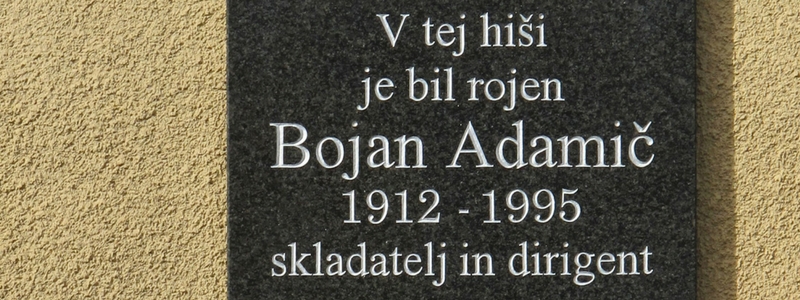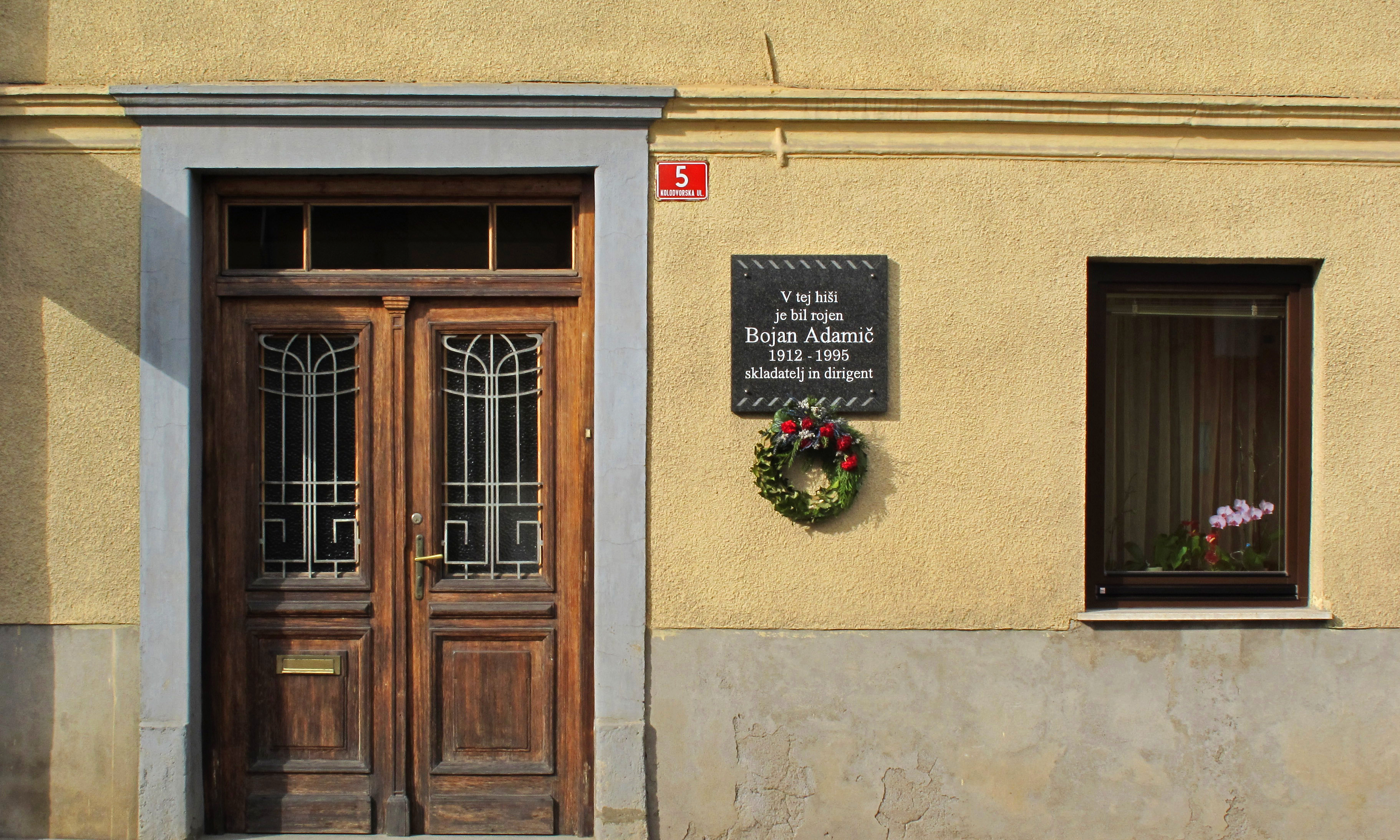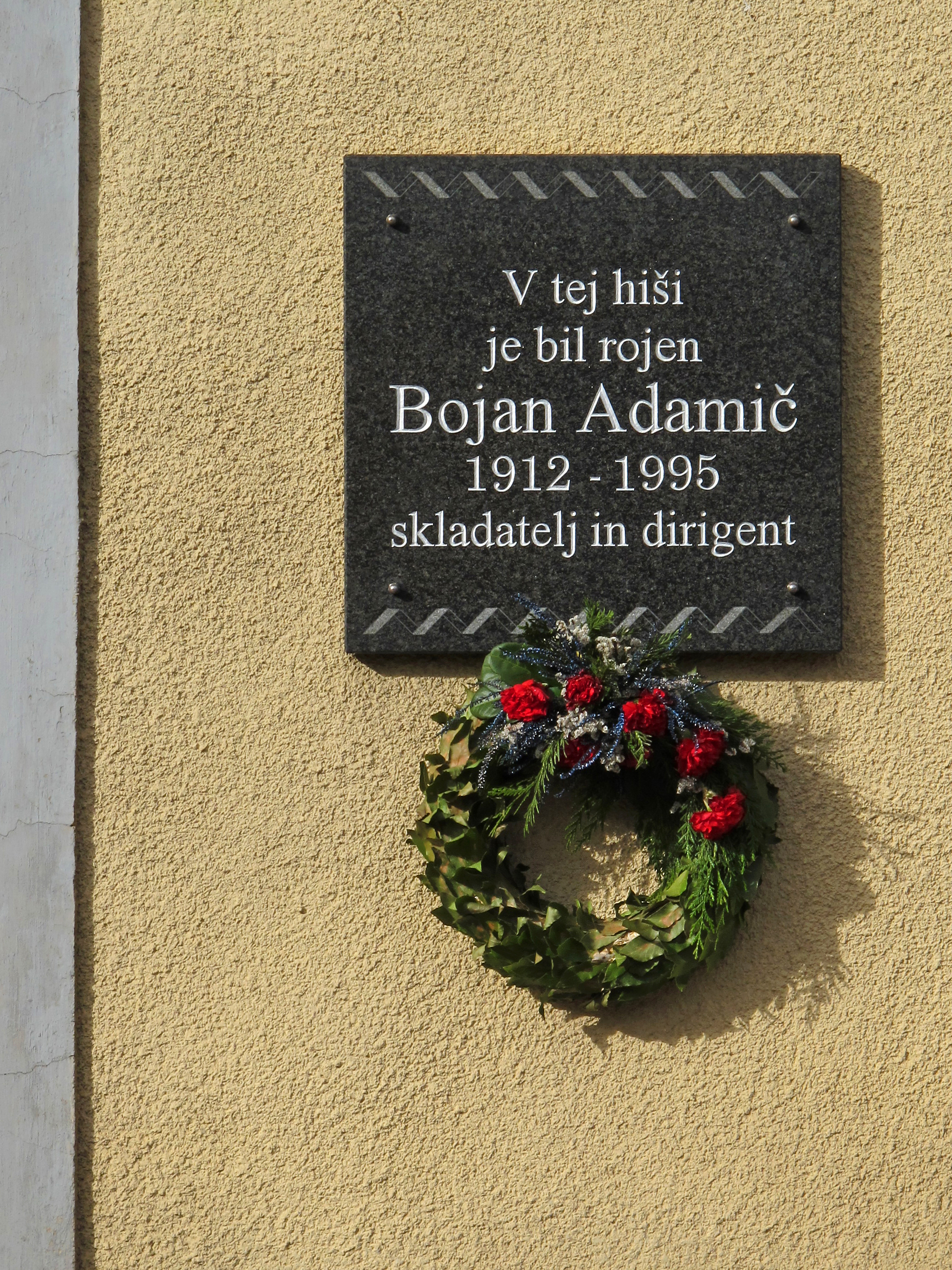In 2000, the Municipality of Ribnica had a granite memorial plaque attached to Adamič’s birthplace in Ribnica; the inscription reads: “Bojan Adamič, 1912–1995, composer and conductor, was born in this house.”
Bojan Adamič
Versatile musician Bojan Adamič (1912–1995) worked as a pianist, composer, conductor, arranger, editor and multi-instrumentalist. With exceptional composing fluidity, Adamič uncompromisingly applied himself to different genres and wrote with great speed. His output encompasses jazz music, pop songs, band music, scores for documentary and full-length feature films, music for puppet shows, theatre and ballet, as well as classical music for chamber, woodwind and symphony orchestras. Despite working in a diverse array of genres, Adamič holds a place in the Slovenian national consciousness primarily as a pioneer of the Slovenian jazz scene, as well as an iconic figure of film music and a prominent chanson composer.
The earliest beginnings of Adamič’s musical career go back to his home environment: his father encouraged him to start playing the piano at age four, and his mother liked to sing to the children. Another inspiration was the local Ribnica wind band, which young Adamič was known to “conduct with a broom”. In 1928, Adamič entered the State Conservatory in Ljubljana, studying organ with church musician Stanko Premrl and trumpet with František Karas. His composing tutor was Slavko Osterc. He completed his formal music education at the Ljubljana Academy of Music, graduating in 1941 in piano with his long-standing professor Anton Ravnik. Tending to incorporate jazz elements into Chopin’s compositions at the academy, Adamič earned the reputation of a promising though quirky pianist. Furthermore, this tendency – flavouring the ordinary of holy mass with film tunes – added attraction to his church organ performances.
He devoted himself more intensively to jazz in 1930, performing with the Ronny Orchestra on hotel terraces in Bled. It was there that a member of the audience, a Swedish noble, introduced him to the music of Duke Ellington, who became Adamič’s enduring idol. The Ronny experience – first playing accordion and then saxophone – was a pivotal point in Adamič’s career, prompting the classically trained musician to seriously venture into popular music and jazz improvisation.
During the pre-war years jazz spread in Ljubljana and was above all popular in tourist resorts, where ensembles like Ronny performed a varied selection of popular, jazz and classical (operetta) music. In the 1930s, the jazz label was applied to several types of light dance music, tunes that in those days proliferated on Slovenian radio programmes and populated music venues. As jazz tuition was not available in professional music circles to music students who developed a passion for this new American genre, the young enthusiasts made do with copies of American records.
After Ronny was disbanded, Adamič formed an orchestra of his own, taking centre stage with his impressive improvisations on the saxophone and thrilling younger audiences at the band’s Bled gigs.
At the outbreak of World War II, the Bojan Adamič orchestra was still active and in 1941 affiliated with a jazz club that served as a cover for Liberation Front actions. In 1943, Adamič joined the partisan resistance forces and was seriously wounded in a battle at Ilova gora. Recovering from his injuries, Adamič could again devote his time to music. During the war, jazz was encumbered with ideological implications: while perceived by many as a most welcome music of the Allies, it was banned by the German and Italian authorities. Adamič incorporated jazz elements into his military marches and arrangements of partisan songs. He shared authorship of the partisan song Hej brigade (Hey Brigades) with lyric writer Matej Bor and composer Pavel Šivic, and of the march song Če zapojemo veselo (If We Sing Joyfully) with France Kosmač.
In the post-war period, Adamič served as head of the music production of Radio Ljubljana, under whose auspices he established the Radio Ljubljana Dance Orchestra (PORL), which later evolved into the current RTV Slovenia Big Band. With Adamič at the helm as its conductor, composer and arranger, the orchestra generated enthusiasm for jazz music also in official circles where some tended to regard the genre as a symbol of capitalism. In 1947, Adamič’s Radio Dance Ensemble held its first post-war jazz concert in Belgrade, Yugoslavia, receiving enthusiastic chanting from the audiences, while the authorities were not so thrilled. Nevertheless, the orchestra persevered in the face of obstacles and, in the 1950s, appeared at important festivals in Slovenia, across Yugoslavia, in Poland, Hungary and the Soviet Union.
Adamič also left a distinctive mark on Slovenian pop music scene. His orchestra accompanied vocalists such as Irma Flis, and Jelka Cvetežar, who popularised Adamič’s pop song Ko boš prišla na Bled (When You Come to Bled). The first Yugoslav pop music festival was held in Belgrade in the 1950s. Adamič conducted and arranged all the songs and repeatedly collaborated with Marjana Deržaj, Beti Jurkovič and Majda Sepe. He had a keen eye for fresh musical talent and helped numerous singers jump-start their career. He was one of the initiators of the establishment, in 1962, of the Slovenian pop song festival in Bled, which was later relocated to Ljubljana.
Also, Adamič had a principal role in the development of chanson in Slovenia. He wrote musical settings of poems by Frane Milčinski-Ježek. Together with Marko Brecelj, Adamič released Cocktail, an album considered an iconic Slovenian chanson record. Between 1982 and 1995, Adamič and singer Meri Avsenak gave recitals of chansons based on texts by Slovenian poets throughout Slovenia and for Slovenian ethnic minorities living in cross-border regions. This artistic partnership prompted the idea of establishing a Yugoslav chanson festival in Rogaška Slatina.
Although having a strong preference for popular genres, Adamič also composed classical music, most notably Koncert za klavir in orkester (Concerto for Piano and Orchestra), 1. and 2. suita za simfonični orkester (Suite for Symphony Orchestra No. 1 and No. 2) and Ljubljanski klavirski koncert (Ljubljana Piano Concerto). He developed a strong artistic partnership with ballet dancer Pino Mlakar; among others, he wrote music for Mlakar’s choreographic work Bela Ljubljana (White Ljubljana). Some of his theatre music or works for the stage include the ballet Naše ljubljeno mesto (Our Beloved City) and the plays Romeo and Juliet, Macbeth, Hamlet, and A Midsummer Night’s Dream by William Shakespeare, Bela krizantema (White Chrysanthemum) by Ivan Cankar, Jurček (Little George) by Pavel Golia and Ta veseli dan ali Matiček se ženi (This Merry Day or Matiček’s Wedding) by Anton Tomaž Linhart.
Maia Juvanc


